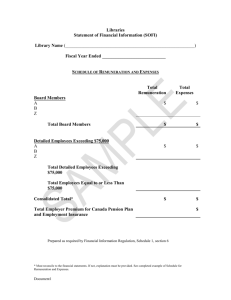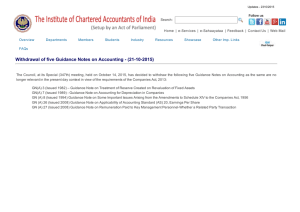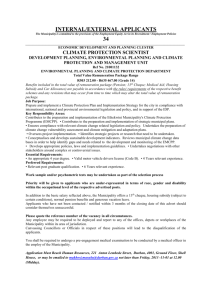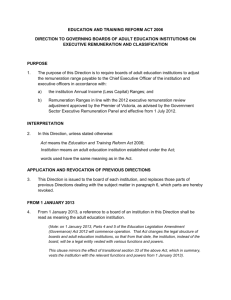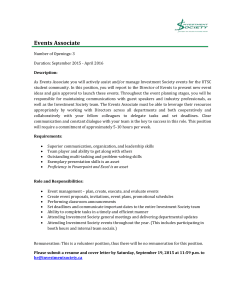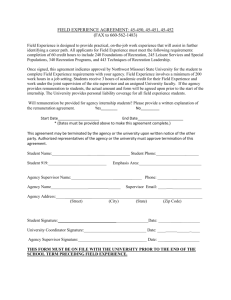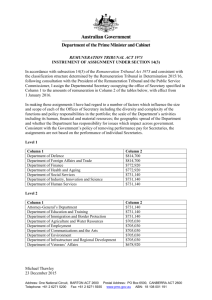Copy of 2ND REMUNERATION POLICY DRAFT 2
advertisement
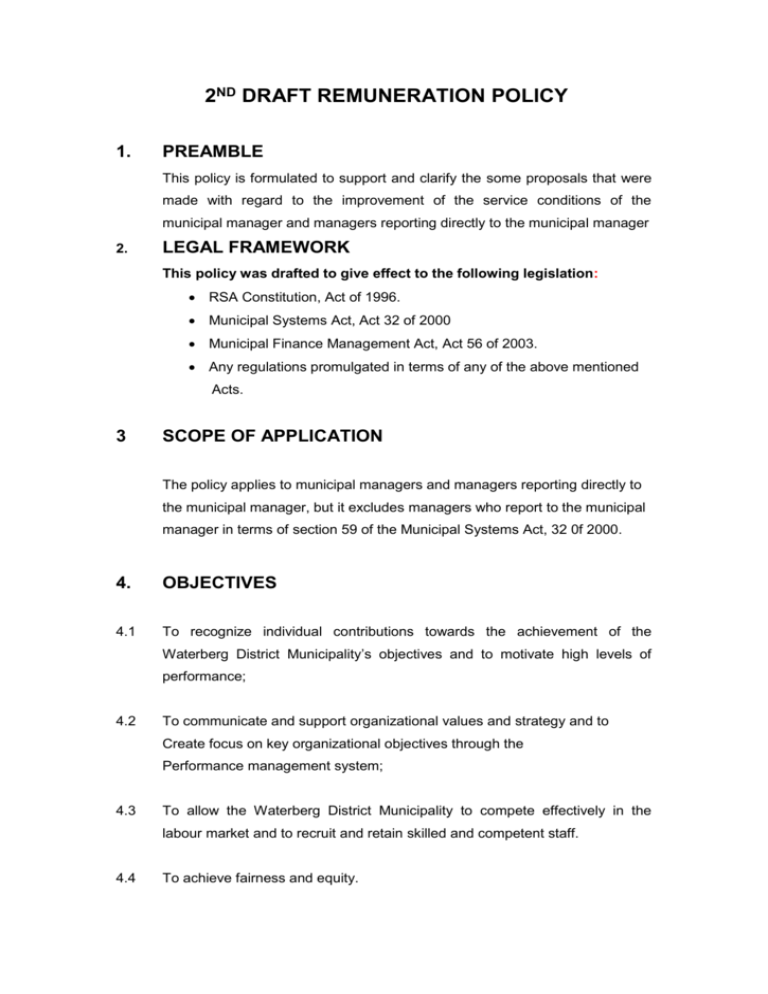
2ND DRAFT REMUNERATION POLICY 1. PREAMBLE This policy is formulated to support and clarify the some proposals that were made with regard to the improvement of the service conditions of the municipal manager and managers reporting directly to the municipal manager 2. LEGAL FRAMEWORK This policy was drafted to give effect to the following legislation: RSA Constitution, Act of 1996. Municipal Systems Act, Act 32 of 2000 Municipal Finance Management Act, Act 56 of 2003. Any regulations promulgated in terms of any of the above mentioned Acts. 3 SCOPE OF APPLICATION The policy applies to municipal managers and managers reporting directly to the municipal manager, but it excludes managers who report to the municipal manager in terms of section 59 of the Municipal Systems Act, 32 0f 2000. 4. OBJECTIVES 4.1 To recognize individual contributions towards the achievement of the Waterberg District Municipality’s objectives and to motivate high levels of performance; 4.2 To communicate and support organizational values and strategy and to Create focus on key organizational objectives through the Performance management system; 4.3 To allow the Waterberg District Municipality to compete effectively in the labour market and to recruit and retain skilled and competent staff. 4.4 To achieve fairness and equity. 4.5 To create a framework for remuneration management that will enable the Municipality to attract and retain staff of high quality and potential. 4.6 To ensure that the Municipality as employer complies with legal prescriptions (e.g. the Basic Conditions of Employment act), as well as the contractual obligations in the letters of appointment and conditions of service. 4.7 To ensure the alignment of remuneration levels following on the merger/incorporation. 5. DEFFINITIONS 5.1. Benefits means non-cash benefits which a manager may receive as part of the manager’s remuneration. 5.2. External equity means a comparison between a manager’s total cost of employment and that of a person employed in a similar position and of a similar role size in the private and public sectors. 5.3. Internal equity means a comparison between a manager’s total cost of employment and that of another person in a similar role size in the municipality concerned. 5.4. Pay line means the pay progression in a managerial position, which is related to role size. 5.5. Remuneration means the total cost of employment and any performance related pay. 5.6. Total cost of employment means the fixed cost paid in respect of each manager. 6. PRINCIPLES A remuneration policy for managers should be based on the following principles: 6.1. Remuneration must be based on the concept of total cost of employment. 6.2. There are two-tiered systems of remuneration. 6.3. It should consider internal equity 6.4. It must be developed as part of an integrated human resource strategy. 7. 7.1. COMPONENTS Role profiling 7.1.1. The IDP and PMS determine role profile, role size and remuneration. 7.1.2. The components of the IDP have a bearing on the organizational structure and role profile for each managerial position. 7.1.3. Role profile comprises of the, number of employee the manager is responsible for and the manager’s operations budget. 7.1.4. The functional role of each managerial position must be linked to the KPA in the IDP. 7.15 The general challenges, experience and key responsibilities of a managerial position must be clear. 7.2. Performance objectives and targets 7.2.1. Key performance indicators of Key Performance Area of the IDP must be determined. 7.2.2. Performance objectives and targets shall form part of the Contract of Employment and Performance Agreement. 7.3. Role size 7.3.1. It assists in understanding the relative position of a manager within the organizational structure. 7.3.2. It can be used to compare remuneration both internally and externally. 7.3.3. The role size shall be determined by a TASK job evaluation system. 7.3.4. The role size of a managerial position shall be of participative, team-based and transparent nature. 7.4. Use of surveys 7.4.1. The Remuneration Committee may use surveys to benchmark against other municipalities and in the private and public sectors. 7.5. Pay-line 7.5.1. A desired pay-line shall be based on internal equity, external equity, affordability and the relative progression of pay based on role size. 7.5.2 The municipality must determine the acceptable range of the total cost of employment (60:40) around the pay-line in respect of each role size. 7.6. Salary 7.6.1. The salary paid to a manager shall fall within a salary range in accordance to with item 7.5.2. 7.6.2. The salary of a manager is based on previous experience, capabilities and skills, expertise, (education qualification, training) and affordability. 7.6.3 The factors used in item 7.6.2 must be used objectively and consistently. 7.7. Exceptions 7.7.1. In exceptional cases, in order to attract and retain individuals who possess key skills and expertise, a municipality may pay more salary than envisaged in item 7.6. 7.7.2. Before appointing a manager on a salary outside the determined salary range, the Remuneration Committee shall report such exception to the Executive Mayor or Mayoral Committee, provide justification for the departure from the determined salary ranges and obtain approval from them. 7.8. Performance-related pay 7.8.1. Performance-related pay is paid in the form of bonuses and is not part of the total cost of employment. 7.8.2. The performance-related pay shall be paid in terms of performance management and development policy. 8. REMUNERATION COMMITTEE The Municipality shall establish a Remuneration Committee. 8.1 Membership of the Committee 7.2.1 The Remuneration Committee will be appointed by the Municipal Council / Executive Mayor / Mayoral Committee as an Ad-Hoc committee, in accordance with the system of delegations adopted by the municipality. 7.2.2 The Remuneration Committee shall consist of external experts in the filed of remuneration, human resources and finance. The committee can request the municipal manager to appoint a consultant who has expertise in the remuneration system applicable in the municipality to assist them with remuneration surveys, job evaluation, work-study and research. 7.2.3 Members of the Remuneration Committee shall be appointed for a duration equal to the term of office of a municipal council as defined in terms of the Municipal Structures Act 117 of 1998. 7.2.4 A vacancy arising within the Remuneration Committee shall be advertised in terms of the advertising policy of municipality and if the municipality is unable to get a suitable candidate, the municipal manager must head-hunt a suitable candidate. 7.2.5 Seventy percent of the members of the Remuneration Committee must not be the residents of the district municipal area in which the local municipality is situated. 7.1 Meeting procedures 7.1.1 The Remuneration Committee shall at its second setting adopt its own meeting procedures to maximize operational efficiency and such procedures shall be submitted to the municipal council for noting. If the council is not satisfied with the procedures it shall require of the Remuneration Committee to revise them in terms of the council decision. 7.5.1 The chairperson will be responsible for the convening the meetings of the committee, maintaining minutes and copies of all reports and data which have been utilized by the committee in reaching its decisions as well as the communication of decisions to the board where applicable. 7.3.2 The frequency of meetings will be determined by the importance of the issues to be dealt with by the committee, but such number of meetings is limited to four (4) per financial year 7.2 Secretariat 7.3 The Head of the HR department or his/her delegate shall provide secretarial services to the Remuneration Committee. 7.3 Instructions to the Committee The Committee will observe the following guidelines and procedures, subject to exercising its discretion, in the conduct of its activities. 7.3.1 The Executive Committee or Executive Mayor through the municipal manager will mandate the remuneration committee to make remuneration recommendations to the Executive Committee or Executive Mayor for approval. 7.3.3. Issues that will be discussed by the remuneration committee are: a) Compilation of the policies related to remuneration b) Approving amendments to the remuneration policy submitted. These amendments will be made by the HR department and submitted to the remuneration committee for approval. c) Complement the work of the performance evaluation panels and the performance audit committee or the audit committee whichever the municipal council uses to assess performance, by ensuring that performance reward is congruent to the actual performance. d) Advice council in the case where council needs expert advice to negotiate a package with the employees covered by this policy. e) Assist council to determine the promptly commence and finalize all (annual) increase of the remuneration packages of the affected managers as soon as the financial statements have been approved. f) In the case of disputes, assist council to formulate a report to the legal defense team of the council and the MEC for Local Government and Housing. 7.4 Powers of Committee 7.4.1 A member of the Remuneration Committee duly mandated by the Remuneration Committee will have full access on request to all financial information of the MUNICIPALITY, including the personnel records relating to any employee in respect of whom the committee will be making its remuneration recommendations. 8. IMPLEMENTATION The Remuneration Committee shall be responsible for monitoring and implementing this policy. 9. REVIEW This policy will be reviewed annually before (the) an (annual) increase of the salary packages of the managers affected by this policy is considered by the Remuneration Committee granted to a manager in the Local Labour Forum.
